New partnership announced with Borderless
Sona and Borderless announce an exciting partnership.
Building a staff schedule couldn’t be easier.
Reduce payroll errors with real-time T&A.
Fill 50% more shifts with your own employees.
Ensure shifts are covered even if you're understaffed.
Manage absence requests and approvals.
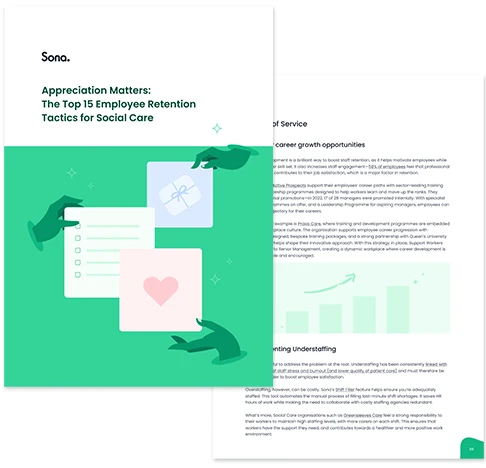
Practical ways to boost team morale with proven examples from across the sector.
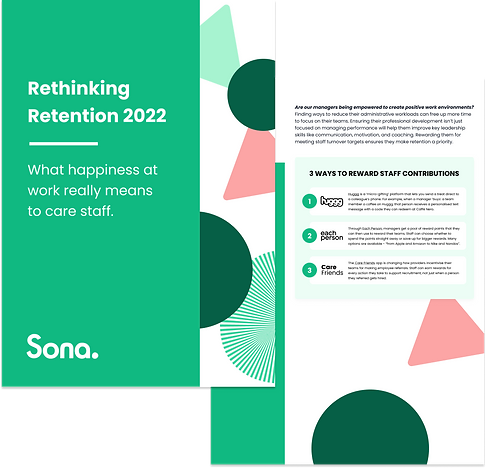
Find out what care employees say matters to them most at work.
Search and view employees with customised permission levels.
Key employment information all in one place.
Store visas, professional certifications and more with easy access.
Control personal and operational details of your staff.
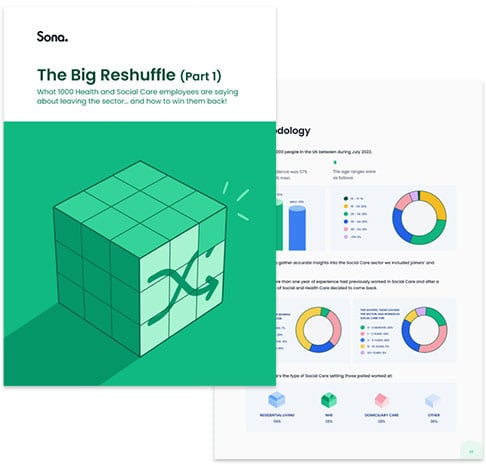
Why are people leaving Social Care, and where are they going?
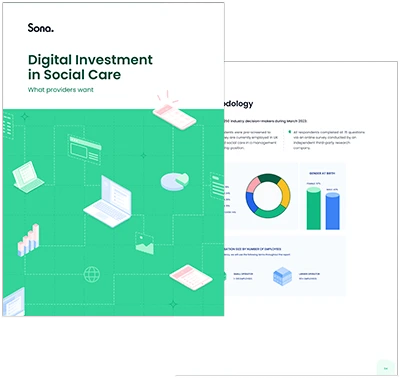
We asked 250 Social Care leaders about their attitudes towards digitisation and their plans for the next 12 months...
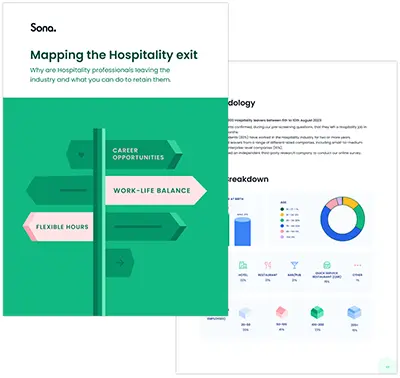
Why are Hospitality workers leaving the industry, and what can you do to retain them?
Share updates with a single click.

Staff can see relevant messages in one place.
Request post-shift feedback from staff.
Recognise staff contributions by sending them praise.
Identify staff at risk of churning.
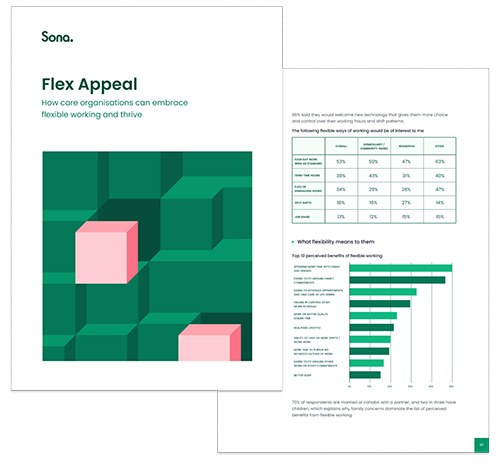
How care organisations can embrace flexible working and thrive.
Maintain quality of care and reduce costs.
Maximise profitability through AI-powered forecasting & scheduling.
Elevate your operational efficiency and guest satisfaction.
Streamline operations across sites.
Developed alongside Social Care experts with decades of combined experience.
See why we are the leading user-friendly, end-to-end platform that prioritises both efficiency and wellbeing.
The Sona Partner Network is an ecosystem of solution experts and complementary technologies.
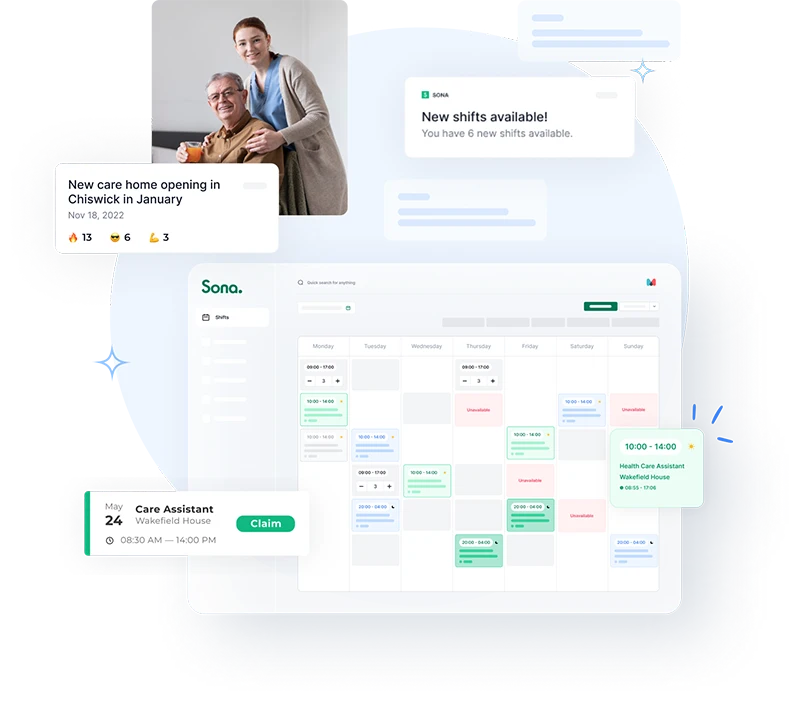
Give staff greater visibility of shifts available to work, with a simple "shift claim" process to increase their income.
Improve employee engagement and retention with a seamless employee communication platform.
Happier staff provide greater customer experiences, which in turn drives return rates, revenues and recommendations.
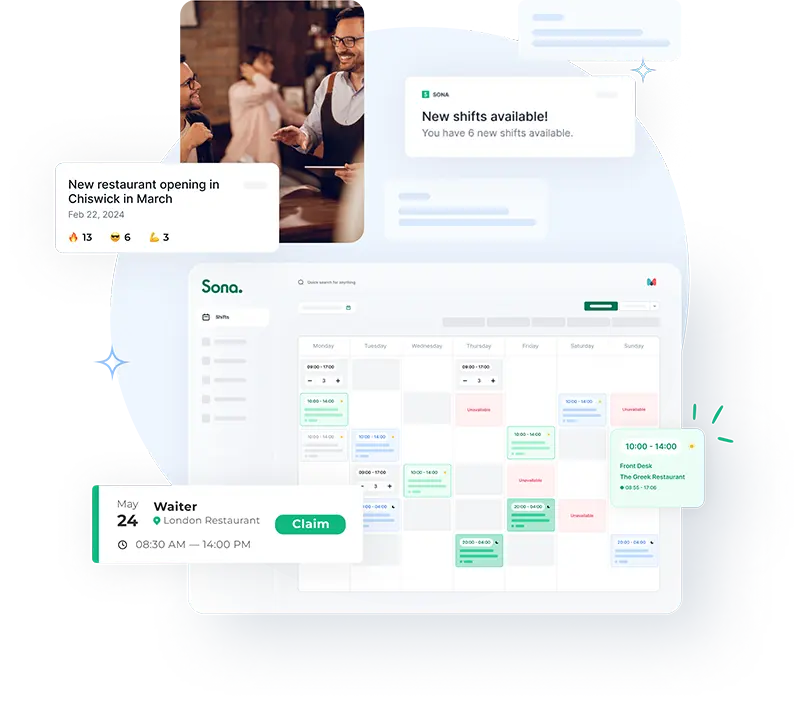
Give staff greater visibility of shifts available to work, with a simple "shift claim" process to increase their income.
Improve employee engagement and retention with a seamless employee communication platform.
Happier staff provide greater customer experiences, which in turn drives return rates, revenues and recommendations.
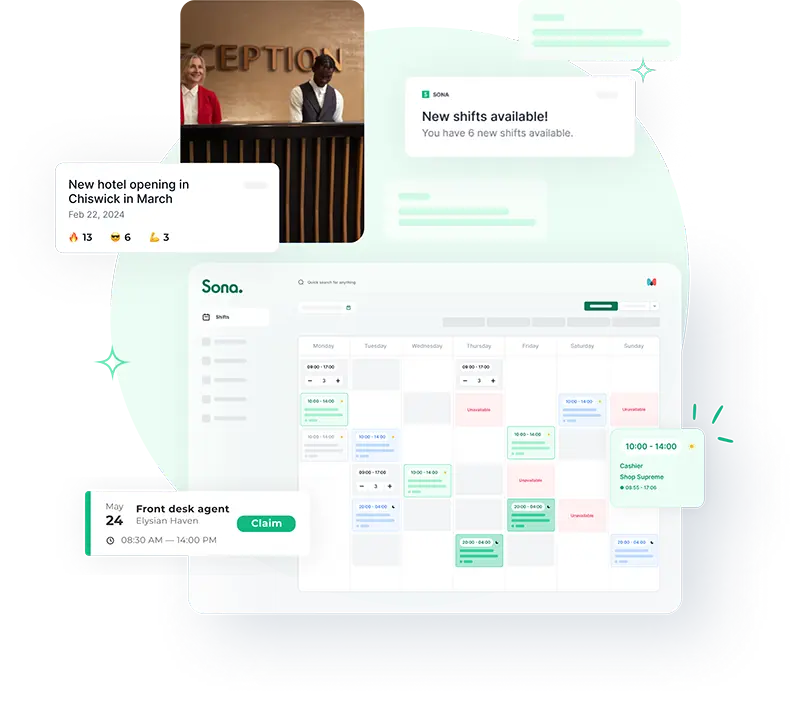
Meet the Sona team online with our webinar series or in-person at an event near you.
New research, insights, and strategies for frontline leaders.
Downloadable templates, reports and guides from Sona.
Stay up to date with the latest Sona news and research.
Learn how our customers are transforming their people operations.
| 3 min read
Sona and Borderless announce an exciting partnership.
| 2 min read
Sona and Found by Lottie announce an exciting partnership.
| 4 min read
Remove operational errors, drive efficiency, and help your team spend less time on admin with a unified solution.
PUBLISHED: February 2025
Download the report to learn how hospitality operators are embracing AI challenges and opportunities in 2025.
PUBLISHED: January 2025
Reveal the most important metrics in 2025!
PUBLISHED: December 2024
This infosheet is packed with practical insights to drive high-quality, low-regret WFM purchases.HR, Social Care, Digital Transformation
The Social Care sector struggles to empower frontline workers which affects everything from workplace performance to staff retention–let’s see what Social Care experts Oli Johnson, Geraint Thomas, and Nuno Almeida have to say about how to address this problem.
8 minute read
Workers are much more likely to leave the sector if they are not empowered in their job, with 41% of Sona’s survey respondents saying that they left a job because they didn’t feel valued. In this webinar, three experts come together to talk about the importance of employee empowerment in the workplace and how technology could be the key to giving employees more freedom, more confidence, and the power to take action when needed.
0:00 | Introduction of topic and speakers (Geraint, Oli, Nuno, and host Aimen).
4.13 | What is employee empowerment and what does it look like in a Social Care setting?
10:18 | How can technology improve employee empowerment?
14:16 | The importance of trust in employee empowerment.
17:56 | How does technology encourage better care in the Social Care sector?
30:12 | How can collaboration ensure that technology results in better care for service users?
43:05 | Preventing digital fatigue.
50:35 | Final thoughts and wrap up.
51:14 | Overview and demo of Sona.
After already co-founding the companies Rainmaking Loft and Catapult, in 2021 Oli turned his focus to co-founding Sona; a platform for employee management and recognition.
Sona’s mission is to change how frontline workers can interact with their work and their management, especially in the Social Care sector, and bring about a new culture of recognition in the workplace.
Geraint is an expert in the use of technology throughout the Health and Social Care sector, with a background working on software implementation within companies such as iCareHealth and The Disabilities Trust. Now, as the director of Guided Innovation, he is at the forefront of helping care providers find and navigate technology that can reduce their costs and increase productivity.
At the heart of what Geraint does is making it easier for carers to do their jobs to the best possible standard by helping care organisations overcome the obstacles they face.
Nuno has an extensive background in the software industry, and now works as a founding member of the Care Software Providers Association (CASPA) and as Chief Executive Officer of Nourish Care Systems.
Nourish is a digital Social Care records system that aims to make the work of care providers easier. At the forefront of the company is bringing digitalisation to care providers across the sector, valuing carers, and increasing the quality of life for those in care.
Up to this point, Social Care doesn’t have the best reputation for employee empowerment and it’s vitally important for the sector that this is changed.
Empowering employees in the Social Care sector means giving them the tools they need to be successful and to take their jobs into their own hands. This means providing opportunities for personal growth and giving them access to real-time information. The ability to keep employees informed means that they feel in control of their work and confident that they can provide the best care possible.
Geraint states that employee empowerment boils down to trust. “It’s the fact that leaders and managers are able to trust the grassroots staff that are working with vulnerable people every single day. They’re the experts, they know what is required every minute of the day for those people they’re supporting.”
In Social Care, it’s important that trust goes both ways. An employee who trusts their managers can feel empowered to raise issues and get them sorted which preserves a positive workplace environment.
In terms of technology, there are concerns that software might be misused by some. However, whole teams of carers should not be treated with suspicion for this reason. It’s important that carers are trusted as a default, and only those who breach the trust are policed. Staff who are using new software should be rewarded for responsible ownership, which is empowering in itself as a method of employee recognition.
The introduction of technology into the Social Care sector is one huge leap in empowering employees as part of modern care delivery. By implementing useful software, the care system can become more coordinated and proactive, which results in better care for residents. The speakers discuss some of the main ways technology can empower better care, such as:
Nuno points out that care resident note sharing software allows care workers to work seamlessly as a team, without the clumsiness of paper notes and verbal updates. “This coordinates the entire team at a level that was just completely impossible to do before. The only way to coordinate teams like this before was verbally, and care teams come together for coffee breaks and handovers, and that’s it. With this sort of behaviour, care teams and care workers who are more proactive […] are able to get to know people and are able to action things.”
Oli then explains that great care comes from the carers to the residents and that carers who are empowered are able to extend that into their work. “Some of our tools are certainly contributing to both the wellbeing of the staff and, by extension, the wellbeing of the people in the care homes. […] Effectively, being able to be a little bit more empowered when you work means that you come into work with more spring in your step and you’re more excited about taking on the challenges.”
The speakers discussed the role of collaboration in the development and implementation of software within Social Care. Specifically, the role of the Care Quality Commission (CQC) and how discussions with the organisation have influenced the use of technology in the sector.
Nuno suggests that the CQC would benefit from the use of technology as it could make care home inspections less frequent or even remote. He says that they are open-minded to the technology that is being used and are interested in exploring the possibilities where inspections aren’t always in-person.
In a similar vein, Geraint says that care providers will have to self-regulate in the future which could be made much easier with softwares such as Nourish and Sona. This applies to rostering systems, medication systems, and HR systems such as turnover and agency use. He says “you need to digitalise as a care provider because your regulator is going to lose a tolerance for not having this data digital.”
On collaboration in general, Oli speaks on the importance of different softwares being able to work alongside each other to be as useful to care providers as possible. “The care planning products that Nourish has is directly related to the scheduling product of Sona. We literally take the hours of care needed for the people that are being supported and we convert that into types of support that are needed and ultimately into shifts.”
The ability to seamlessly work between multiple platforms will streamline the care service and empower staff by giving them all the information they need to provide great care.
On the topic of digital transformation across the Social Care sector, the concern of ‘digital fatigue’ was raised. This is the issue of too much technology overwhelming carers and therefore not being as helpful as expected.
Nuno was the first to speak on the subject and suggested that the reality is that carers, no matter their age, can be excellent users of technology and it can really enrich their working lives. “I think that a lot of how people take technology and use it is in how you communicate it and how you manage that change.”
He says that it’s not age that is the problem, it’s how carers are trained and managed when it comes to using unfamiliar technology. He continues, “technology is there to augment care service, not to guide care service”’ This is one of the main points raised, as there is an emphasis on the technology being useful to carers, not just another box to tick.
Geraint was in agreement with this and said that in a sector as highly regulated as Social Care, every process needs to earn its place. At the centre of every piece of Social Care software needs to be the aim of helping the carers provide better care. Once the technology has proven to be useful, to make something faster or safer, digital fatigue will vanish.
On the causes of digital fatigue, Oli spoke about the use of Social Care software at work only. It is often the bombardment of technology that starts to take over life outside of work that causes digital fatigue. He says,”‘outside of work, my personal belief is that the interaction should be very, very limited.”
However, he states the importance of staff being able to contact their managers with problems, feedback, and picking up extra shifts whenever they need to. As technology should be used to make life and work easier, he says “you should be using it because it benefits you as an individual, not because it benefits the organisation.”
The Social Care sector is on the cusp of a digital transformation that will bring care teams together and enable them to provide better care to residents. By giving carers the tools to feel empowered in their work, teams will be more content and have more confidence in their decision-making and care skills. Bring your workforce up to date by exploring time-saving softwares that help to coordinate and empower your staff in ways that have not been possible before.
If you liked this article, why not subscribe to our newsletter to get the latest news and views delivered straight to your inbox?
6 min read
The care industry's crisis needs to be solved. One of the solutions – maybe the most important – is improving staff retention. Learn why it’s important and how to do it.
3 min read
The care sector is facing a serious workforce crisis. Employee recognition programmes offer a simple solution to the challenge of high staff turnover.
8 min read
Sona’s adapting to change webinar addressed how leaders can be better at guiding their teams through upcoming changes. Here are the main takeaways.